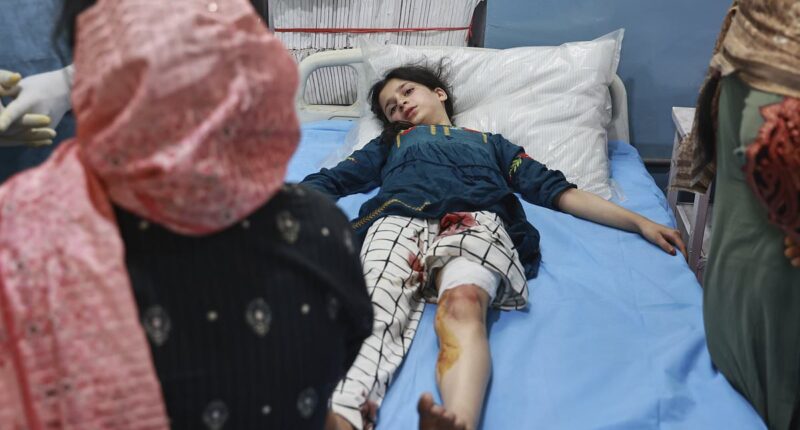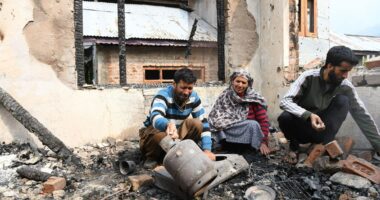Nuclear war with India could break out ‘at any time’, Pakistan’s defence minister has said, as fears of a tit-for-tat bloodshed continue to grow.
During an interview with Pakistani TV channel Geo News, the country’s defense minister Khawaja Asif expressed concern over the possibility of an all-out war with India. He mentioned that in the event of a standoff, a nuclear war could potentially occur at any time.
Asif went on to state that if India escalates the situation to the point where there is a threat of nuclear conflict, the blame for such a scenario would lie with India.
His remarks were made following reports of 31 individuals, including four children, being killed in missile strikes conducted by Indian aircraft on nine suspected terrorist sites. Additionally, 57 people were reported to have been injured as a result of these strikes, according to Pakistani officials.
Meanwhile, India told more than a dozen foreign envoys in New Delhi that ‘if Pakistan responds, India will respond,’ sparking fears of a larger military conflict in one of the world’s most dangerous – and most populated – nuclear flash-point regions.
It comes after Pakistan vowed to strike back against India, warning it reserves the right to respond to overnight missile strikes at a ‘time, place and manner of its choosing’.
Islamabad also deemed India’s assault an ‘act of war’ that it claims deliberately targeted civilian areas – an allegation roundly denied by New Delhi.
The overnight attack was in response to a massacre of civilians at a beauty spot in the Indian section of the disputed Kashmir region last month.

A Pakistan Army soldier stands guard at the entrance as smoke rises from the Bilal Mosque, after it was hit by an Indian strike in Muzaffarabad, the capital of Pakistan-administered Kashmir, May 7

A girl who lives in a village near the Line of Control between India and Pakistan, and was wounded during shelling by Pakistan is treated at a hospital in Uri, Indian controlled Kashmir, Wednesday, May 7, 2025

A view of the site of an Indian missile strike near Bahawalpur, Punjab province, Pakistan, 07 May 2025. India stated that it conducted military strikes on nine sites in Pakistan in retaliation for a deadly militant attack on tourists in Kashmir
India had blamed Pakistan for sponsoring the militants behind the slaughter – but said Wednesday’s missiles were targeted at terrorist infrastructure, rather than state sites.
As most world leaders, including Sir Keir Starmer, called for peace, former Conservative premier Rishi Sunak, born in Britain to parents of Indian descent, and himself a Hindu, posted on X: ‘India is justified in striking terrorist infrastructure. There can be no impunity for terrorists.’
While India has a declared policy of only using nuclear in response to an attack, Pakistan is understood to be willing to use its warheads tactically on the battlefield to deter a conventional assault.
Several wars have already been fought over Muslim-majority Kashmir since the departure of Britain in 1947 – when the state’s Hindu Maharaja chose to be part of India. Kashmir remains divided along a hotly disputed border line.
As Pakistan moved tanks near Kashmir on Wednesday, Prime Minister Shehbaz Sharif said the armed forces had been authorised to undertake ‘corresponding actions’.
Residents living around the de facto border fled today after India launched attacks on what it said was nine ‘terror camps’ inside Pakistan overnight.
Both nuclear-armed countries subsequently exchanged artillery fire. Pakistan said five were killed in shelling near the Line of Control, and India said at least seven were killed their side.
As the smoke subsided, the Indian army this morning said it had been proportionate in its actions, ‘focused, measured and non-escalatory’.
But Pakistan’s National Security Committee, chaired by the prime minister, said the strikes had been carried out on a ‘false pretext’ of the ‘imaginary terrorist camps’.

Residents living around the de facto border fled today after India launched attacks on what it said was nine ‘terror camps’ inside Pakistan overnight

Tanks are transported on a road in Muridke near Lahore, Pakistan, May 7, 2025

No military facilities were targeted in the strikes
India says it was attacking bases used by those it blames for an attack on the Indian-run side of Kashmir last month – the worst massacre of civilians in India since 2008.
Commenting on the conflict, US President Donald Trump told reporters at the Oval Office today: ‘I know both very well. I want to see them work it out’.
‘I want to see them stop’.
‘If I can do anything to help, I will be there’, the president added.
Fears of a full-blown conflict between the two nuclear powers continue to escalate, with Indian prime minister Narendra Modi today cancelling plans to visit Europe.
The escalation comes at a fragile moment for Pakistan’s $350 billion economy, which recently emerged from an economic crisis with the government trying to shore up finances and make progress on the $7 billion International Monetary Fund loan programme of 2024.
Pakistan said that six locations were hit in overnight strikes, adding that it had shot down five Indian jets and a drone. New Delhi has not commented on the claims.
Fighter jets roared through the skies over the Himalayan territory this morning and explosions could be heard near the ‘Line of Control’ in a strike that lasted 25 minutes.
Survivors surveyed the aftermath of the destruction and gathered shredded belongings as senior officials on both sides continued to beat their chests.
‘There were terrible sounds at night, there was panic among the people,’ said Muhammed Salman, who lives in Muzzaffarabad, the largest city in the region.
Several houses were damaged in an attack that half collapsed a mosque and the neighbouring school was closed on Wednesday.
‘The children are very scared. We couldn’t leave our place during the night but now we are moving to the house of our relatives,’ said 52-year-old mother Jamila Bibi.
Indian missiles hit six locations in Pakistan-administered Kashmir and in the country’s eastern Punjab province, killing at least 26 people, including women and children, said Pakistan’s military spokesperson, Lt. Gen. Ahmed Sharif.
Islamabad said a three-year-old child was among eight civilians killed in the strikes.
Sharif added that Indian jets also damaged infrastructure at a dam in Pakistan-administered Kashmir, calling it a violation of international norms.
The were expected and, according to its army, targeted ‘terrorist sites’. Pakistan has rejected the claim.
The Indian assault – dubbed ‘Operation Sindoor’ – was said to have targeted nine ‘terrorist camps’ in ‘Pakistan and Pakistan-occupied Jammu and Kashmir’.
Pakistan said that India had struck civilians, killing children, and responded with artillery and mortar fire into Indian-administered Kashmir.
Shaina Nana Chudasama, a former spokesperson for the ruling party in India, the BJP, claimed that ‘no civilians’ had been harmed by the strikes, despite reports to the contrary.

India said it had evidence of further ‘impending’ attacks, and was acting to ‘deter’ militantism

Debris of an aircraft lies in the compound of a mosque at Pampore in Pulwama district of Indian controlled Kashmir, Wednesday, May 7, 2025

A part of an aircraft bearing French language writing is seen on the ground in Wuyan near Indian-administered Kashmir’s main city of Srinagar on May 7, 2025

Pakistan moves tanks along its highways early on Wednesday after the overnight clashes

India fired missiles at Pakistani territory early on May 7, killing several people, according to Pakistan, which said it had begun retaliating in a major escalation
Pakistan vowed to respond to the missile strikes, maintaining that the ‘terror camps’ were an Indian fabrication.
‘Pakistan has every right to give a robust response to this act of war imposed by India, and a strong response is indeed being given,’ Prime Minister Sharif said today.
He said the ‘deceitful enemy has carried out cowardly attacks at five locations in Pakistan’ and that his country would retaliate.
The armed forces later said they had been ‘fully authorised’ to carry out ‘corresponding actions’ in response to the strikes overnight.
Defence Minister Khawaja Muhammad Asif echoed the sentiment, telling AFP the retaliation had ‘already started’, after the military earlier said it would respond ‘at a time and place of its own choosing’.
Indian media cited officials in saying that seven people, including a woman and two children, had been killed and 38 injured in strikes into Indian territory from Pakistan.
The figure was later updated to 12.
The BBC said it was able to confirm that at least 10 civilians had died and 32 had been injured in Indian-administered Kashmir following Pakistani artillery shelling.
‘The firing was particularly intense in Poonch and Mehandar regions,’ the broadcaster reported, citing residents.
Homes and shops in the northernmost regions of India were reported to have been badly damaged.
Pakistan was said to have ‘pounded dozens of forward villages with artillery and mortar shelling along the Line of Control in Jammu and Kashmir’.
India’s army accused Pakistan of ‘indiscriminate’ firing across the Line of Control (LoC), the de facto border in Kashmir, with bursts of flame as shells landed, AFP reporters saw.

People participate the funeral ceremony of those who were killed in India’s attack on Muridke, near Lahore, Pakistan, on May 7

A general view of a damaged structure in the Kotli district of Pakistan-administered Kashmir on May 7, 2025

Locals stand on the debris of destroyed structures at the Government Health and Educational complex in Muridke about 30 kilometres from Lahore, on May 7, 2025

This handout photograph released by the Pakistan’s Inter Services Public Relations (ISPR) on May 7, 2025 shows paramedics giving treatment to an injured man at a hospital in Bahawalpur, Punjab province, following strikes in Pakistan

Local residents and members of the media examine a building damaged by a suspected Indian missile attack near Muzaffarabad, the capital of Pakistan controlled Kashmir, in Wednesday, May 7
India today accused Pakistan of ‘again violating’ a ceasefire agreement by ‘firing artillery in Bhimber Gali in Poonch- Rajauri area’.
The army ‘is responding appropriately in a calibrated manner,’ it added.
India has maintained its position that it was striking terrorist camps in the wake of a massacre in Indian-administered Kashmir in April.
Foreign Secretary Vikram Misri said today that India had intelligence suggesting that ‘further attacks’ were ‘impending’ before they took action.
‘Our intelligence monitoring of Pakistan-based terrorist modules indicated that further attacks against India were impending,’ he said in a briefing on the operation today.
‘There was thus a compulsion both to deter and to pre-empt.’
Misri blamed last month’s attack in Indian-administered Kashmir on ‘Pakistani and Pakistan-trained terrorists’, the BBC reports.
He said it was carried out by The Resistance Front, which he claimed was a front for Pakistani Indian-proscribed terrorist organisation Lashkar-e-Taiba.
Misri said that investigations into the April 22 attack had revealed the ‘communication nodes of terrorists in and to Pakistan’.
He argued that ‘the features’ of the attack on civilians ‘also tie in with Pakistan’s long track record of perpetrating cross-border terror in India’.
The crisis was triggered by the militant attack on tourists in Indian-administered Kashmir, which left 26 people dead, mainly Hindu men, in the tourist hotspot of Pahalgam.
Nobody has claimed the attack but New Delhi said the gunmen were from Pakistan-based militant group Lashkar-e-Taiba, a UN-designated terror organisation with a history of carrying out attacks on Indian soil.
The group has long been rumoured to have murky links to the Pakistani military establishment – which Islamabad denies.
Hindu-majority India accuses Islamic Pakistan of funding and encouraging militancy in Kashmir, the Himalayan region both nations claim in full but rule in part.
The shooting, which Indian authorities believe was carried out by Pakistani assailants, prompted a flurry of military and diplomatic action as both sides engaged in exchanges of fire along the ‘Line of Control’.
India launched naval drills, test-fired several long-range missile systems and suspended a key treaty that ensures India supplies Pakistan with water from the Indus River, a provision that is crucial for Pakistan’s water supply and agricultural economy.
Pakistan, which has denied any involvement in the attack, deployed its air force to close its airspace to Indian airlines and has mobilised its army.
India identified two of the three April 22 attackers as ‘terrorists’ from Pakistan waging a violent revolt in the Indian-administered but Muslim-majority part of Kashmir.
The majority of the dead were Hindu tourists from India, with reports from witnesses and survivors claiming the gunmen were ordering civilians to recite Islamic prayers and shooting those who were unable to do so.
A Pakistani militant group known as The Resistance Front (TRF) claimed responsibility in the wake of the attack, only to rescind the statement days later and blame the initial claim on a communications breach.
New Delhi said the gunmen were from Pakistan-based militant group Lashkar-e-Taiba, a UN designated terror group long rumoured to have links with the Pakistani military establishment. Islamabad denies to link.
LeT’s main objective is to merge the whole of Kashmir with Pakistan.
Dr. Mohammad Faisal, Pakistan’s High Commissioner to the UK has blasted foreign powers for not intervening sooner to cool tensions between India and Pakistan.
He accused India of attacking civilians and said that retaliation ‘should’ happen.
He told the Today Programme: ‘During the night there were multiple attacks on Pakistan and we have been alerting the world of this eventuality for the last 15 days or so.

Workers paint a red cross symbol over the roof of a hospital as a preventive measure amid the ongoing border tensions, in Srinagar on May 7, 2025

Indian school students take part in a mock drill at Rajkiya Sarvodaya Vidyalaya in New Delhi, India, May 7 2025

Students take part in an emergency mock drill as part of the nationwide civil defence mock drill at a school in New Delhi on May 7, 2025, as border tensions surge
‘I have been urging all the international community to intervene, to escalate the situation, to improve the relations. Sadly nothing much has happened.
‘Yesterday Indian attacks have led to 26 deaths of civilians, which includes women and children, young girls, and 46 injured.
‘There is a lot of anger in Pakistan. We have shot down some five planes, three Raphales and Su-30s and two or three drones.’
He confirmed that Pakistan was shelling India, adding: ‘If Pakistan is attacked, we will retaliate. So if from the other side there are bombs and shells falling on our side of course retaliation will be there.
‘Retaliation should also be there for the 26 deaths that have happened, all of civilians. And all during the day today their funerals will be carried out all over Pakistan.
‘This is a cause of grave concern for us and for two nuclear-armed powers.’
The British government said in the wake of the strikes that it was ready to ‘support’ the de-escalation of tensions.
UK business secretary Jonathan Reynolds told the BBC today that the clashes were ‘hugely worrying’.
‘Our message would be that we are a friend, a partner to both countries. We stand ready to support both countries.’
‘Anything we can do to support [de-escalation], we are here are willing to do,’ he said.

















